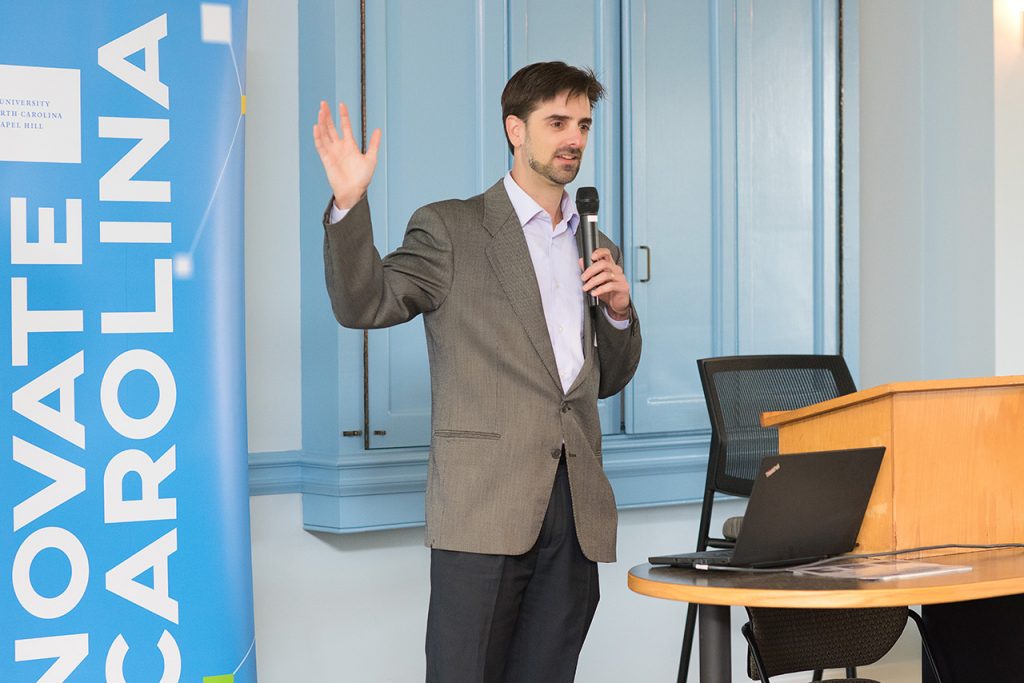


How can universities prepare students for the future economy when we’re not certain what that economy will look like? While there’s no text-book answer or crystal-ball solution, a group of workforce, entrepreneurial and educational experts convened at the latest Innovate Carolina Network Forum to offer well-studied insights on what lies ahead for today’s students turned tomorrow’s professionals.
Jeff DeBellis, director of economic policy and analysis at the North Carolina Department of Commerce shared research findings and recommendations, joining a panel of educational and business leaders to offer practical advice for faculty and staff who work with students.
For UNC students – and the faculty and staff who guide them – the call was clear: tap into the many tools and resources available through Innovate Carolina, the campus-wide initiative for innovation and entrepreneurship (I&E). If the jobs of the future will demand that you think and work differently, there’s no better preparation than a university I&E network that teaches you an entrepreneurial mindset and takes you beyond business as usual.

If you can write down a job function as a set of instructions on a piece of paper that almost anyone can follow, it’s not the type of occupation that’s likely to grow, says DeBellis. Instead, the greatest occupational growth will happen with jobs that offer less structure and guidance. The data backs up DeBellis’ perspective. According to his presentation, routine jobs have declined steadily in North Carolina since 1990, while the share of jobs defined as “non-routine cognitive” – those that aren’t repetitive and require strategic thinking – have steadily increased from 26 percent in 1990 to 40 percent in 2018. With the majority of jobs in North Carolina now requiring non-routine work, universities are wise to prepare students with the right mix of skills, including soft and STEM skills, such as:
— Complex problem solving
— Critical thinking
— Judgment and decision making
–Mathematics
–Operations analysis
–Programing and science
–Systems analysis and evaluation
–Technology design
Unlike many universities that create a single I&E program or center that lives one place on campus, Carolina has created a campus-wide I&E network that infuses innovation into the work of all schools and departments. This makes it possible to instill and entrepreneurial mindset and skillset to more people across campus. For instance, there are now more than 100 innovation-oriented courses across campus, including courses in business, public health, computer science, social work, media and journalism, and other disciplines. Further, the Shuford Program in Entrepreneurship allows students of any major to earn a minor in entrepreneurship. Carolina’s approach to casting a wider entrepreneurial net has gained recognition. A recent U.S. News & World Report ranking of undergraduate entrepreneurship programs placed UNC-Chapel Hill fourth in the U.S. – its highest such ranking ever.
DeBellis also notes that these kinds of skills pay off in terms of job growth and earning power. “There’s a little bit of a narrative that everyone doesn’t need to go to school and that a two-year degree is good enough,” he says. “That exists for certain fields, but when you look broadly, education does pay. The higher growth is definitely correlated with education.”
From the perspective of Gary Miller, director of University Career Services, entrepreneurial skills are a way to balance short-term job opportunities with long-term possibilities. “Part of our student challenge is figuring out: ‘What skills do I need to develop broadly that will help me succeed over the course of my career?” he says. “And, ‘What is that particular last mile that will help me jump on the on-ramp for the first opportunity that I have after graduation?’”
Success in the future workforce isn’t just about the skills you teach students. It’s also how you teach them, noted several of the panelists.
Shandol Hoover, director of student development and special projects for Honors Carolina, spoke about the value of experiential learning. Hoover describes a Maymester course called Silicon Revolution taught at UNC by professor Jim LeLoudis, the dean of the Carolina Honors program.
“Students spend two days in Chapel Hill and a week in Palo Alto visiting with venture capitalists, legal experts, innovators and entrepreneurs at places like Google, Facebook and Stanford – and with all ranges of people at different stages of their career,” says Hoover. “Then they come back and spend time in the Research Triangle Park. I think it gives them a full understanding of where we’ve been, where we are and where we’re going.”
Yet, embedding skill development into the student experience doesn’t have to happen on a trip. It also happens in the heart of the Carolina campus, notes Chi Nwogu, an entrepreneur-in-residence with the Blue Innovation Community. This community consists of 35 entrepreneurial-minded students who live in Carmichael Residence Hall, where a makerspace has been built into the ground floor as a cornerstone of dorm life.
“We do workshops on topics like systems thinking and design thinking,” says Nwogu. “It’s about helping students try things, design things and take chances. You have to fail multiple times to succeed, and we promote that – from making a prototype to taking the next step to actually making a business.”
The Blue Makerspace is one of four makerspaces that are part of Carolina’s Be A Maker (BeAM) network on campus. And as the heavy traffic in these spaces show, UNC students have a penchant for making. More than 4,000 people spend over 33,000 hours in the makerspaces annually. And an increasing number of faculty include makerspaces as part of their course curricula — 148 courses and rising
Teaching the right skills – and even embedding them into a more experiential learning process – is important, but not sufficient, said several of the workforce panel experts. Universities have to give students ways to test drive those skills in real scenarios.
In fact, universities underserve their students by letting them live in on-campus bubbles without nudging them to get involved in internships or independent study programs, says Julia Wuench, director of North Carolina Market, Inspiring Capital.
“There are so many opportunities for students to earn academic credit, get paid to work and get experience while they’re in school,” Wuench says. “I think universities have a critical role to play in getting students off campus and embedded into the community.”
Hoover agrees and highlighted a variety of faculty-led, internship-based global programs offered by Carolina Honors, including semesters in Silicon Valley, London, Washington, DC and Cape Town, South Africa. “Students can have an entrepreneurial or innovative internship experience in any of those locations,” she says. “And in Silicon Valley and London, they can complete a minor in entrepreneurship as well. So, they’re taking class, getting an internship and can complete the entrepreneurship minor.”
The minor is earned through the Shuford Program in Entrepreneurship, which requires all of its students to complete an internship program on top of the courses they take. And students and UNC startup leaders can also
Internships are just one way that Carolina students can put entrepreneurial skills and passions into practice. There’s also the Carolina Challenge campus-wide pitch competition, a host of hackathons and the Dreamers-Who-Do program, which funds a variety of student entrepreneurial projects.
The good news for students, faculty and staff is that finding these resources has never been easier. The first steps toward an entrepreneurial mindset and success in the future workforce begin by visiting the resources section of Innovate Carolina website.